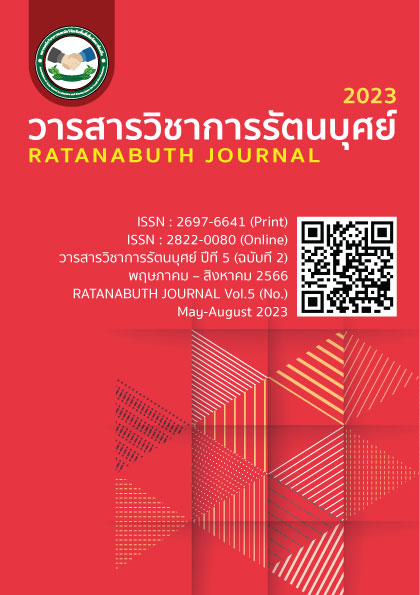21st Century Administrator’s Skills Effective to Professional Learning Community of Schools Under Loei Primary Educational Service Area Office 1 21st Century Administrator’s Skills Effective to Professional Learning Community of Schools Under Loei Primary Educational Service Area Office 1
Main Article Content
Abstract
Changes in the 21st century have resulted in school administrators having to develop the skills needed to develop the education system in response to the changes. professional learning community It is a process of creating change by learning from the work of a group of people coming together to develop learning management.
The 21st century school administrators’ skills are management abilities in accordance with the mission that requires cooperation between the teachers and the administrators, which is important to the professional learning community in the schools. Therefore, the purposes of this research were to: 1) study the 21st century school administrators’ skill level, 2) study the level of the professional learning community in the schools, 3) study the relationship between the 21st century school administrators’ skills and the professional learning community in the schools, 4) study the 21st century school administrators’ skills affecting the professional learning community in the schools, and 5) create a predicative equation of the 21st century school administrators’ skills affecting the professional learning community in the schools under Loei primary educational service area office 1. The sample was a group of 299 School Administrators’ and teachers in the schools under Loei primary educational service area office 1 in the academic year 2022. The research tool was a questionnaire. Statistics used to analyze data by frequency, percentage, average, standard deviation, Pearson’s product moment correlation coefficient analysis, and stepwise multiple regression analysis.
The results of the study revealed as follows: 1) The 21st century school administrators’ skills. Overall, is at high level. 2) The professional learning community in the schools of the schools. Overall, is at high level. 3) The 21st century school administrators’ skills and the professional learning community in the schools under Loei primary educational service area office 1 using Pearson’s Product Moment Correlation Coefficient had a positive relationship with a high level. 4) The five aspects of the 21st century school administrators’ skills as Technology skills, administrative skills, Leadership skills, Creativity skills and communication skills, consideration could predict the professional learning community in the schools at the .01 level of significance with the predictive power of 56.70 (R2 = 0.567) percent and the standard error of estimate of ± 0.26886
Article Details

This work is licensed under a Creative Commons Attribution-NonCommercial-NoDerivatives 4.0 International License.
References
กระทรวงศึกษาธิการ. (2560). การพัฒนาครูเพื่อพัฒนาคุณภาพผู้เรียนตามศาสตร์พระราชาด้วย Active Learning และ Professional Learning Community (PLC) สู่คุณภาพ Thailand 4.0. กรุงเทพฯ: กระทรวงศึกษาธิการ.
จักรกฤษณ์ สิริริน. (2562). Innovation Management ติดปีกสถานศึกษาสู่ยุค 5.0. สืบค้นเมื่อวันที่ 28กรกฎาคม 2565 จาก http://www.salika.co//09/05/Innovation-Management-educational-5-0-era/.
ธานินทร์ ศิลป์จารุ. (2560). การวิจัยและวิเคราะห์ข้อมูลทางสถิติด้วย SPSS และ AMOS. กรุงเทพฯ: บิสซิเนสอาร์แอนด์ดี.
ธีระนันต์ โมธรรม. (2564). ภาวะผู้นำของผู้บริหารที่ส่งผลต่อการเป็นชุมชนแห่งการเรียนรู้ทางวิชาชีพ ในโรงเรียนสังกัดสำนักงานเขตพื้นที่การศึกษามัธยมศึกษา เขต 22. ปริญญาครุศาสตรมหาบัณฑิต, สาขาวิชาการบริหารและพัฒนาการศึกษา, มหาวิทยาลัยราชภัฏสกลนคร.
บุญชม ศรีสะอาด. (2560). การวิจัยเบื้องต้น (พิมพ์ครั้งที่ 10). กรุงเทพฯ: สุวีริยาสาส์น.
มัณฑนา ศรีพุทธา. (2564). ชุมชนการเรียนรู้ทางวิชาชีพที่ส่งผลต่อทักษะของผู้เรียนในศตวรรษที่ 21. วิทยานิพนธ์. ปริญญาครุศาสตรมหาบัณฑิต สาขาวิชาการบริหารการศึกษา, คณะครุศาสตร์, มหาวิทยาลัยราชภัฏรำไพพรรณี.
มณฑาทิพย์ นามนุ. (2561). ทักษะของผู้บริหารสถานศึกษาในศตวรรษที่ 21 สังกัดสำนักงานเขตพื้นที่การศึกษาประถมศึกษาปทุมธานี เขต 2. วิทยานิพนธ์. ปริญญาศึกษาศาสตรมหาบัณฑิต,สาขาวิชาการบริหารการศึกษา คณะครุศาสตร์อุตสาหกรรม, มหาวิทยาลัยเทคโนโลยีราชมงคลธัญบุรี.
ภัทราพร เกษสังข์. (2549). การวิจัยทางการศึกษา. คณะครุศาสตร์. เลย: มหาวิทยาลัยราชภัฏเลย.
วิจารณ์ พานิช. (2558). แนวโน้มการบริหารสถานศึกษาในศตวรรษที่ 21. กรุงเทพฯ: สำนักงานเลขานุการคณะศึกษาศาสตร์และศิลปะศาสตร์, มหาวิทยาลัยหาดใหญ่.
วิราวรรณ์ เพ็ชรนาวา. (2563). แนวทางการพัฒนาชุมชนแห่งการเรียนรู้ทางวิชาชีพของโรงเรียนมัธยมศึกษาในสหวิทยาเขตวิภาวดี กรุงเทพมหานคร. วิทยานิพนธ์. ปริญญามหาบัณฑิต, ภาควิชาพื้นฐานทางการศึกษา, บัณฑิตวิทยาลัย, มหาวิทยาลัยศิลปากร.
วรลักษณ์ ชูกำเนิด, เอกรินทร์ สังข์ทอง และชวลิต เกิดทิพย์ (2557) รูปแบบชุมชนการเรียนรู้ทางวิชาชีพครูสู่การเรียนรู้ในศตวรรษที่ 21 บริบทโรงเรียนในประเทศไทย. วิทยานิพนธ์มหาบัณฑิต คณะศึกษาศาสตร์, มหาวิทยาลัยสงขลานครินทร์ วิทยาเขตปัตตานี.
สัตตบุษย์ โพธิรุท. (2564). ทักษะการบริหารของผู้บริหารโรงเรียนในศตวรรษที่ 21 ที่ส่งผลต่อประสิทธิผลโรงเรียน สังกัดสำนักงานเขตพื้นที่การศึกษามัธยมศึกษา เขต 21. วิทยานิพนธ์. หลักสูตรปริญญาครุศาสตรมหาบัณฑิต, สาขาวิชการบริหารการศึกษา, มหาวิทยาลัยราชภัฏสกลนคร.
สุณิสา แพทย์พิพัฒน์. (2564). ทักษะของผู้บริหารสถานศึกษาในศตวรรษที่ 21 ที่ส่งผลต่อชุมชนการเรียนรู้ทางวิชาชีพในสถานศึกษา สังกัดสำนักงานเขตพื้นที่การศึกษาประถมศึกษาจันทบุรี. วิทยานิพนธ์. ปริญญาครุศาสตรมหาบัณฑิต สาขาวิชาการบริหารการศึกษา, คณะครุศาสตร์, มหาวิทยาลัยราชภัฏรำไพพรรณี.
ศุภลักษณ์ ชัยอาวุธ. (2564). การเป็นชุมชนแห่งการเรียนรู้ทางวิชาชีพที่ส่งผลต่อประสิทธิผลการบริหารงานวิชาการในโรงเรียนสังกัดสำนักงานเขตพื้นที่การศึกษาประถมศึกษาชัยภูมิ เขต 2. วารสารวิชาการและวิจัยมหาวิทยาลัยภาคตะวันออกเฉียงเหนือ. ปีที่ 11 ฉบับที่ 3 กันยายน–ธันวาคม 2564. (109-123).
เอกพล อยู่ภักดี. (2560). ปัจจัยทางการบริหารที่ส่งผลต่อชุมชนแห่งการเรียนรู้ทางวิชาชีพของครูในโรงเรียน สังกัดสำนักงานเขตพื้นที่การศึกษามัธยมศึกษาเขต 30. วารสารวิจัยมหาวิทยาลัยขอนแก่น (ฉบับบัณฑิตศึกษา). สาขามนุษยศาสตร์และสังคมศาสตร์. 5(2), 36-46.
Alva, A. F. (2009). Promoting effective leadership through a professional learning community (Doctoral dissertation). Retrieved from Pro Quest Dissertations and Theses database. (UMI No. 3353880).
Cronbach, L.J. (1990). Essentials of psychological testing. (5th ed.). New York: Harper & Row.
Du Four, R. (2004). Schools as Learning Communities. Educational Leadership. 61(8): 6-11.
Hord Shirley. M.. (2009). Professional learning communities. Journal of Staff Development, 30(1), 40-43.
Krejcie, R.V., & D.W. Morgan. (1970). “Determining Sample Size for Research Activities”. Educational and Psychological Measurement. 30(3) : 607 – 610.
Kindred. (1975). School Public Relation. New Jersey : Englewood Cliffs.
Likert, R.. (1967). The Method of Constructing and Attitude Scale. In Reading in Fishbeic, M (Ed.), Attitude Theory and Measurement (pp. 90-95). New York: Wiley & Son.
Memisoglu, S. P. (2015). The Perception of Teachers About Management Skills of School Principals. International Journal of Humanities and Social Science, 5(2), 21-28.


